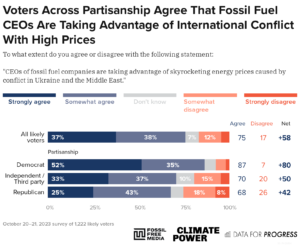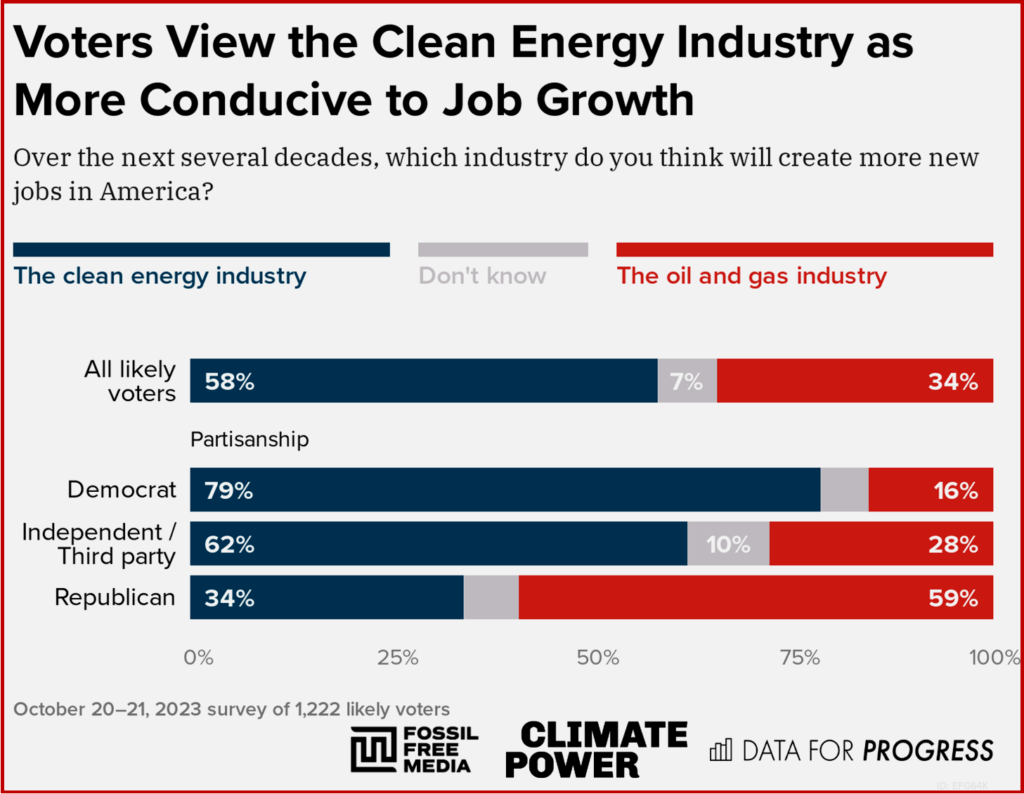
Click for more enlightened data.
During the last two years, oil and gas companies have posted record profits, with such companies as ExxonMobil, Chevron, and Shell all reporting historic earnings in the billions of dollars. Meanwhile, American consumers have had negative experiences as gas prices fluctuated, reaching a record high of $5.02 a gallon in 2022.
New polling from Data for Progress, Climate Power, and Fossil Free Media finds that voters strongly blame high energy prices on large oil companies and their CEOs.* They think, and believe these companies have too much power in government. Yet, voters remain optimistic about a transition away from fossil fuels and toward clean energy. This shall we say “awakened attitude” should be a warning to the fossil fuel dependent Republican party since it is bipartisan.

Click for more.
When asked whom they blame for higher energy prices, voters assign “a great deal” of blame to members of OPEC+ (47%), market instability driven by global conflict (42%), oil and gas CEOs (42%), and oil and gas companies generally (39%)
Three-quarters of voters, including majorities of Democrats, Republicans, and Independents, further agree with the following statement: “CEOs of fossil fuel companies are taking advantage of skyrocketing energy prices caused by conflict in Ukraine and the Middle East.”
Only 35% of voters trust oil and gas companies to adhere to pollution reduction promises without oversight and enforcement,. Moreover, there is strong voter appetite for the government making polluters pay. Three-quarters of voters would support making oil and gas companies pay a tax on their excess profits, while 70% would support making polluters pay for climate damages.
Majorities, yes majorities, of Independents and Republicans support both of these proposals.
To measure whether voters view a tradeoff between building out clean energy and fossil fuel production when informed about domestic oil production, the pool conducted a split test which randomized treatments across respondents. Half of respondents were assigned to read an argument prioritizing investments in clean energy after stating that U.S. oil production is currently at a record level; the other half of respondents were assigned to only read the argument about clean energy buildout, without mention of oil production. All respondents then also read a statement that called for more drilling to increase oil and gas production.
With both halves of the split test, 56% of respondents agree that clean energy buildout can strengthen energy independence while lowering costs for American families, while between 36% and 37% agree that green-lighting additional oil and gas drilling will strengthen energy independence and lead to energy dominance.
Significantly, the survey also finds that 68% of voters view the growth of the clean energy industry as a positive economic force, with 58% believing it will be a greater driver of job creation than the fossil fuel industry (34%). However, a plurality of voters (44%) think that the rollout of renewable energy is taking place “too slowly,” including 63% of Democrats and 47% of Independents, compared with only 20% who are concerned about the rollout expanding “too quickly.”
*Survey Methodology
From October 20 to 21, 2023, Data for Progress, in collaboration with Climate Power and Fossil Free Media, conducted a survey of 1222 likely voters nationally using web panel respondents. The sample was weighted to be representative of likely voters by age, gender, education, race, geography, and voting history. The survey was conducted in English. The margin of error is ±3 percentage points.

About Ken Zino
Ken Zino, editor and publisher of AutoInformed, is a versatile auto industry participant with global experience spanning decades in print and broadcast journalism, as well as social media. He has automobile testing, marketing, public relations and communications experience. He is past president of The International Motor Press Assn, the Detroit Press Club, founding member and first President of the Automotive Press Assn. He is a member of APA, IMPA and the Midwest Automotive Press Assn.
He also brings an historical perspective while citing their contemporary relevance of the work of legendary auto writers such as Ken Purdy, Jim Dunne or Jerry Flint, or writers such as Red Smith, Mark Twain, Thomas Jefferson – all to bring perspective to a chaotic automotive universe.
Above all, decades after he first drove a car, Zino still revels in the sound of the exhaust as the throttle is blipped during a downshift and the driver’s rush that occurs when the entry, apex and exit points of a turn are smoothly and swiftly crossed. It’s the beginning of a perfect lap.
AutoInformed has an editorial philosophy that loves transportation machines of all kinds while promoting critical thinking about the future use of cars and trucks.
Zino builds AutoInformed from his background in automotive journalism starting at Hearst Publishing in New York City on Motor and MotorTech Magazines and car testing where he reviewed hundreds of vehicles in his decade-long stint as the Detroit Bureau Chief of Road & Track magazine. Zino has also worked in Europe, and Asia – now the largest automotive market in the world with China at its center.


Voters Blame Oil and Gas Companies for High Energy Prices
Click for more enlightened data.
During the last two years, oil and gas companies have posted record profits, with such companies as ExxonMobil, Chevron, and Shell all reporting historic earnings in the billions of dollars. Meanwhile, American consumers have had negative experiences as gas prices fluctuated, reaching a record high of $5.02 a gallon in 2022.
New polling from Data for Progress, Climate Power, and Fossil Free Media finds that voters strongly blame high energy prices on large oil companies and their CEOs.* They think, and believe these companies have too much power in government. Yet, voters remain optimistic about a transition away from fossil fuels and toward clean energy. This shall we say “awakened attitude” should be a warning to the fossil fuel dependent Republican party since it is bipartisan.
Click for more.
When asked whom they blame for higher energy prices, voters assign “a great deal” of blame to members of OPEC+ (47%), market instability driven by global conflict (42%), oil and gas CEOs (42%), and oil and gas companies generally (39%)
Three-quarters of voters, including majorities of Democrats, Republicans, and Independents, further agree with the following statement: “CEOs of fossil fuel companies are taking advantage of skyrocketing energy prices caused by conflict in Ukraine and the Middle East.”
Only 35% of voters trust oil and gas companies to adhere to pollution reduction promises without oversight and enforcement,. Moreover, there is strong voter appetite for the government making polluters pay. Three-quarters of voters would support making oil and gas companies pay a tax on their excess profits, while 70% would support making polluters pay for climate damages.
Majorities, yes majorities, of Independents and Republicans support both of these proposals.
To measure whether voters view a tradeoff between building out clean energy and fossil fuel production when informed about domestic oil production, the pool conducted a split test which randomized treatments across respondents. Half of respondents were assigned to read an argument prioritizing investments in clean energy after stating that U.S. oil production is currently at a record level; the other half of respondents were assigned to only read the argument about clean energy buildout, without mention of oil production. All respondents then also read a statement that called for more drilling to increase oil and gas production.
With both halves of the split test, 56% of respondents agree that clean energy buildout can strengthen energy independence while lowering costs for American families, while between 36% and 37% agree that green-lighting additional oil and gas drilling will strengthen energy independence and lead to energy dominance.
Significantly, the survey also finds that 68% of voters view the growth of the clean energy industry as a positive economic force, with 58% believing it will be a greater driver of job creation than the fossil fuel industry (34%). However, a plurality of voters (44%) think that the rollout of renewable energy is taking place “too slowly,” including 63% of Democrats and 47% of Independents, compared with only 20% who are concerned about the rollout expanding “too quickly.”
*Survey Methodology
From October 20 to 21, 2023, Data for Progress, in collaboration with Climate Power and Fossil Free Media, conducted a survey of 1222 likely voters nationally using web panel respondents. The sample was weighted to be representative of likely voters by age, gender, education, race, geography, and voting history. The survey was conducted in English. The margin of error is ±3 percentage points.
About Ken Zino
Ken Zino, editor and publisher of AutoInformed, is a versatile auto industry participant with global experience spanning decades in print and broadcast journalism, as well as social media. He has automobile testing, marketing, public relations and communications experience. He is past president of The International Motor Press Assn, the Detroit Press Club, founding member and first President of the Automotive Press Assn. He is a member of APA, IMPA and the Midwest Automotive Press Assn. He also brings an historical perspective while citing their contemporary relevance of the work of legendary auto writers such as Ken Purdy, Jim Dunne or Jerry Flint, or writers such as Red Smith, Mark Twain, Thomas Jefferson – all to bring perspective to a chaotic automotive universe. Above all, decades after he first drove a car, Zino still revels in the sound of the exhaust as the throttle is blipped during a downshift and the driver’s rush that occurs when the entry, apex and exit points of a turn are smoothly and swiftly crossed. It’s the beginning of a perfect lap. AutoInformed has an editorial philosophy that loves transportation machines of all kinds while promoting critical thinking about the future use of cars and trucks. Zino builds AutoInformed from his background in automotive journalism starting at Hearst Publishing in New York City on Motor and MotorTech Magazines and car testing where he reviewed hundreds of vehicles in his decade-long stint as the Detroit Bureau Chief of Road & Track magazine. Zino has also worked in Europe, and Asia – now the largest automotive market in the world with China at its center.